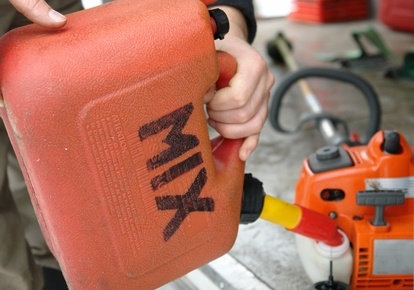
Portable fuel cans, or gas cans, are both a necessity and convenience. Fuel cans have a capacity of ten gallons or less. Fuel cans manufactured after January 1, 2009 must meet certain standards to comply with updated regulations. The Environmental Protection Agency, the California Air Resource Board and the Consumer Product Safety Commission set these regulations.
An automatic closure spout must automatically return to a closed position when not engaged for pouring. In addition, cans manufactured after the January 1, 2009 compliance date do not have secondary vent holes. These changes lessen chances for spillage.
In 2008, President Bush signed the Children's Gasoline Burn Prevention Act, requiring that portable gasoline containers manufactured for sale in the U.S. on or after January 17, 2009 adhere to certain child safety requirements. With that law in effect, gasoline joined charcoal lighter fluid, torch fuel and turpentine on the list of flammable substances whose containers are mandated to have child-resistant closures.
Standards set by the Environmental Protection Agency require gasoline containers to limit the release of volatile organic compounds into the atmosphere. According to the Portable Fuel Container Manufacturers Association, a gas can must be a permeation-resistant container that limits hydrocarbon leakage to 0.3 grams per gallon per day. Using a fuel can that limits gasoline vapor emissions contributes less to ground-level ozone (smog).
The Federal Hazardous Substance Act requires certain containers to alert consumers of the possible dangers that the contained product may pose. Accordingly, fuel cans must display proper warning labels to alert consumers of the potential hazards.
Although standards are set for the manufacture of new containers, no laws exist preventing the use of old cans. Because of this, retailers who have remaining inventory of non-compliant, older cans may still sell them until they are gone. As of 2010, nothing requires replacement of old cans that may not comply with new industry standards. OSHA-approved metal safety containers, primarily utilized in commercial situations and not classified as portable fuel containers intended for residential use, also escape the new regulations.The regulations also have no bearing on cans for sale outside of the U.S.
Although not mandated, it's a good idea to adhere to established safety guidelines when dealing with the transportation or storage of a flammable liquid such as gasoline. According to the Environmental Protection Agency, you may want to make use of improved gas cans to reduce your exposure to vapors. Exercise care when dispensing gasoline and avoid spills by filling all equipment and vehicles on a hard surface and in a well-ventilated area, away from children and animals. Store gasoline in a cool, dry location. Because of the risk of heat or impact explosion, do not store gasoline in the trunk of a vehicle or in a vehicle itself.